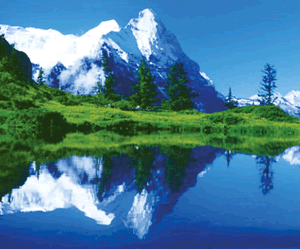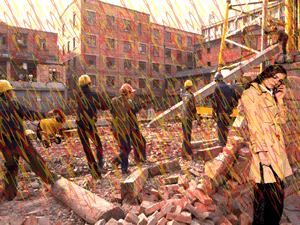Positive Health Online
Your Country

Add as bookmark
Noise - Turn Down the Volume of Daily Life
by Handan T Satiroglu(more info)
listed in stress, originally published in issue 155 - February 2009
"True silence is the rest of the mind; it is to the spirit what sleep is to the body,
nourishment and refreshment." – William Penn
nourishment and refreshment." – William Penn
On a recent vacation at a quaint fisherman's village on the Lycian coast, I had a brief encounter with silence. As the afternoon drifted into a balmy, warm evening under a lavender sky streaked with hues of orange and pink, I watched the waves gently lap against the rocks, catching faint breaths of sea-salt in the early autumn breeze. As I dreamily poured into my thoughts, an inner question rose with unprecedented force: When was the last time my thoughts were not punctuated with the shrill of man-made, mechanic sounds? I couldn't recall.

In a world submerged under a sea of technology, where machines buzz, hum, grunt, groan and jar, there is little question that we spend a good portion of our days in a boundless, uninhibited cacophony of noise. From music thundering next door, to cell phones bleeping in libraries, to jets roaring overhead, noise descends upon us from every conceivable direction. It seems that silence has become a distant and faint echo in our day and age.
Sound Hazards
The problem? Some will argue that a post-industrialized world awash in electronic gadgets is bound to be noisy – somewhat of a mere nuisance against the infinite benefits technology affords us. Noise is life. Noise is strength. Yet, while we might have grown complacent about the uninterrupted drone of modern life, mounting evidence suggests that noise might be hurting us in more ways than we think. "Calling noise a nuisance is like calling smog an inconvenience. Noise must be considered a hazard to the health of people everywhere," says Dr. William Stewart, a former US Surgeon General.[1] Not only are hearing problems on the rise – nine million at last count in the UK,[2] and 71 million people in Europe [3] – but research also reveals that noise plays a significant role in everything from heart disease, immune system problems, and insomnia to psychiatric disorders.[4] "From ringing cell phones to cheesy music at the grocery store to all the little whistles and clicks from your computer," our world is rife with background noise, says Laura Stack, author of the Exhaustion Cure. "Although reacting to noise stimulation is an important survival tool in an evolutionary sense, the relentless din of today's world," she says, "raises blood pressure, impairs concentration, causes tension and headaches and reduces workforce productivity."

The magnitude and scope of stress brought on by noise should not be underestimated. Noise-induced stress can drive people to an early grave, according to a report by World Health Organization (WHO). At a rate of three percent annually, this equates to 6,500 deaths in the UK alone, observes Britain's leading audiologist Deepak Prasher. "The new data provide the link showing there are earlier deaths because of noise. Until now, noise has been the Cinderella form of pollution, and people haven't been aware that it has an impact on their health," he states in an interview to the Daily Mail.[5]
With other studies showing that noise can create psychiatric disorders, and even foetal hearing loss, the question remains: Why have we as a species turned our backs on silence? Walter Bagehot, the influential British essayist lamented humanity's inability to remain quiet "as one of the conspicuous failings of mankind". Those words were written in 1870 – a time before the advent of Hummers, diesels, and cell phones. Virtually every creature except man knows how to be still. "The cat in front of the fireplace, the wolf in its den, even a hummingbird knows how to stop its activity and be still," Edward Henderson quotes Zen Master John Daido Loori in an exquisite National Geographic article.[6]
Why Humans Generate Noise
Explanations about why humans feel compelled to generate noise are legion, but perhaps the words of a sociologist acquaintance of mine come close to the truth. "I believe noise started the day after humans evolved the brain complexity to recognize their own non-existence," he offered sardonically, as we listened to the crackling of leaves beneath our heavy hiking boots on our way to Rocky Mountain National Park. The bottomless void of absolute silence can be a painful mirror, reflecting back on the listener the enormity, ultimately, of one's own aloneness in the universe, and our eventual non-existence. Aristotle was not underestimating it when he observed: "Absolute silence leads to sadness. It is the image of death."Fear of death aside, silence also confronts us with the most dreaded: the self. Upon entering silence, "we come face to face with everything we repress and deny within ourselves," says Melanie Mulhall, a practising shaman and spiritual teacher based in Colorado.[7] In our TVs, iPods, diesel engines, music, we drown out the mind's endless chatter, the spiralling of self-doubt, criticism, shame and recrimination. As Swiss-born psychiatrist and influential thinker Carl Jung put it, by seeking refuge in a high-volume world, we 'avoid the shadow'.
But the truth is, noise, and the accompanying hysteria and superficiality endemic in our culture make us still emptier, needier and sicker. Finding silence has never been more important. If we wish to not only preserve and restore our health, but also our spirit, we must find a way back to silence – not sometime in the distant future, but today. As you go through the ritual of creating silence, and producing a serene state over the course of your day or week, it will have a positive effect on your health.
Power in Silence
Exposed to silence and stillness, you might get more than you bargained for. As John Lane discovers in The Spirit of Silence: Making Space for Creativity, silence touches us in more ways than one – "as something which offers sanctuary and tranquillity, as something which brings us into touch with the inner depths which elude us in modern life...as a source of joy or as an inspiration for art, literature and music...because it awakens us to the present moment".[8] It is this sheer delight and revelling in the moment that sets the stage in all our actions.What active steps can you take to avoid or block out sounds? Following are some suggestions to help you create a 'silent space' in your daily life.
Begin your day with silence
Before rushing headlong into the day's hurricane of activity, do something relaxing. If you arise late in the morning, grab for coffee, and turn on the radio or news, you are setting yourself up for tension for the rest of the day. Instead, close your eyes, take three deep breaths and seek that inner quiet for the next ten minutes in bed. "Pretend that your eyes are locked shut, and will not open when you try to open them," says Joshua Johnston, a certified hypnotist based in the Detroit Metro area, where reducing stress is something that comes up in just about every client he sees.[9] Then relax your eye muscles and let that relaxation spread through your entire body, while imagining being in a remote, tranquil spot.
Perhaps you can recall a time when you lay in the woods on a cool summer's evening, listening to the gurgling of the river, and the orchestrated sounds of birds. Or you remember time spent on a remote island, soaking up the sun, moist sand in-between your toes, watching the unfathomably open, blue skies...Imagine the place, hear the sounds, smell the scents as you let your imagination wash away all unwanted sounds and tensions.
By performing a centring activity such as this, you can begin your day in a serene and peaceful state. This way you will be better prepared to handle sensory bombardment throughout the day.
Retreat into Mother Nature
"Absolute silence on this planet is a myth," says Dr Dorothy M Neddermeyer, co-author of 101 Great Ways to Improve Your Life.[10] The vast majority of people in the Western culture fail to consider that beyond the industrial soundscape, there are wonderful, melodic sounds of nature. As Dr Neddermeyer observes, noise makes us hear very little, silence makes us hear the music within nature: the howl of the wind, leaves rustling, birds and wild animal calls, insect murmurs, frogs or toads croaking, a creek gurgling, the splash of a water fall, rain splashing on the ground, thunder, lightening, tree branches falling, ice cracking on a river, lake or pond, fish splashing in water. As we have saturated the world with loud devices, we have also moved away from nature. So abandon the synthetic, highly charged world of wires and machines from time to time and immerse yourself in the subtle richness of nature. Savour those moments in snow, rain, mud, grass, sand. Mini-retreats in nature are not a luxury, but a necessity to nourish our bodies, emotions and soul.
Set aside a silent retreat at home
Most of us fail to realize the detrimental effects of the cacophony coming our way in a typical household – TV in the background, dogs barking, kids screaming at one another, stereo drowning out one form of noise with another. By constantly receiving noise at varying decibels, we are directly overloading our central nervous systems and possibly creating tension and anxiety.So set aside an evening at home specifically for relaxation. Create a serene spot reserved solely for meditation, soul searching, reading or just plain old rumination. Inform your family or household members that you need some quiet time where you will not be disturbed.
The first step, of course, in creating your retreat from the world is to unplug phones and other electronic devices. Once you have muted all the electronics, inject elements into your retreat that mirror nature, such as plants, flowers, and essential oils that help you make pleasant associations, fostering a deep sense of relaxation. Next, try filling the space with silky cushions and soft, calming colours such as light green, peach or lavender to further evoke a sense of peace.
If it is challenging to create a silent environment, try to emulate it with calming music, turning on a white noise machine that echoes sounds of nature, or wearing ear plugs with a decibel reduction rating of 30. Allow your thoughts to meander as you drift into a place of inner peace in your retreat.
The world will never sound the way it did for our cave-dwelling or even pre-industrial ancestors. Silence is no longer to be found everywhere. Ours is a relentless, frenetic, hysterical post-industrial culture centring on the TV set, computer and cell phone. We will never be completely free from the jolts that a largely noisy world throws our way, but with these tips we can actively create an atmosphere that minimizes auditory stimuli. Instead of allowing your surroundings to determine how you feel, these rituals give you the power to control your health – and life.
References
1. League for the Hard of Hearing – http://www.lhh.org/noise/facts/health.html 2. http://www.deafnessresearch.org.uk/Did%20you%20know+1885.twl
3. http://www.deafnessresearch.org.uk/One%20in%20six%20suffering%20from%20hearing%20loss+3388.twl
4. Jha A. Noise of modern life blamed for thousands of heart deaths: Stress of exposure adds to risks. The Guardian. August 2007. And: http://www.cbc.ca/consumers/market/files/home/noise/index.html
5. MacRae F. Pollution by noise 'kills 6,500 a year in Britain. Daily Mail. London. 23 August 23, 2007.
6. Readicker-Henderson E. The Quietest Place in the World. National Geographic Traveller. September 2006.
7. Personal Interview with Melanie Mulhall. October 2008.
8. John Lane. The Spirit of Silence: Making Space for Creativity. Green Books. UK. Backcover. 2006.
9. Personal interview with Joshua Johnston. November 2008.
10. Personal Interview with Dr Dorothy M Neddermeyer. November 2008. Her website can be found at http://www.drdorothy.net/
Comments:
-
No Article Comments available